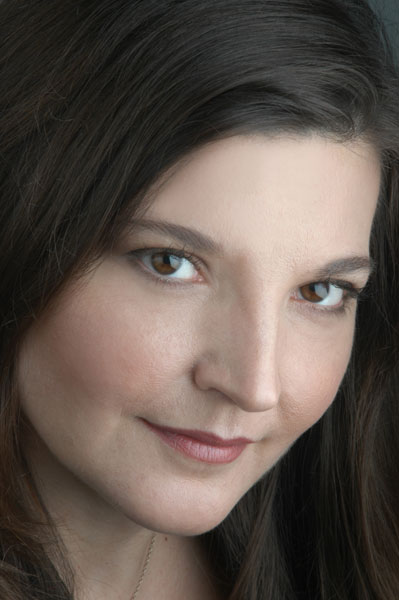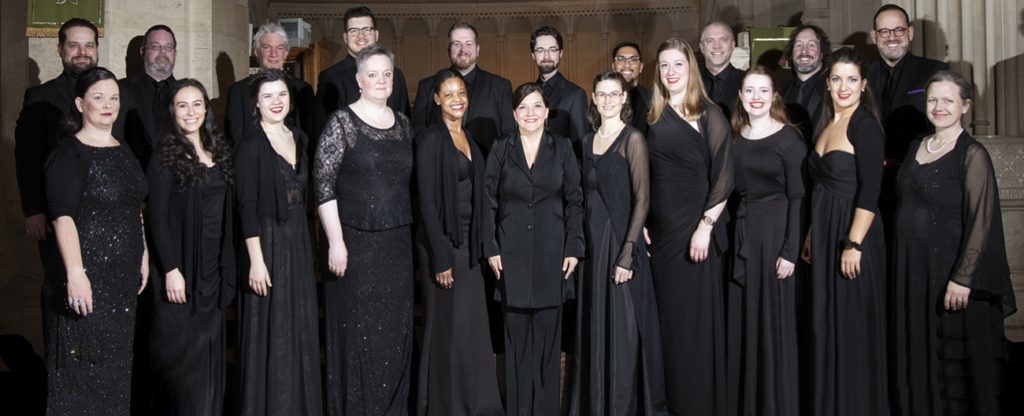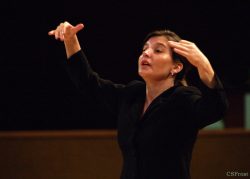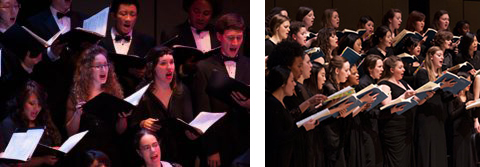Hot on the heels of a JUNO win, York U’s Head of Choral Conducting sits down with Brainstorm to reflect on this remarkable accomplishment; muse about the future of the concert hall; and elaborate on the unique gift that choirs offer in the unsettling era of COVID.
“Choirs are important for connections, to each other and to our own voices, to our culture and our history… Music also gives us hope and strength as we move forward,” says Professor Lisette Canton, School of the Arts, Media, Performance & Design.
Canton is a choral and orchestral conductor, vocal coach and early music specialist and head of choral conducting at York University where she oversees three ensembles: the Chamber Choir, the Concert Choir and Men’s Chorus, and is in charge of the graduate program in choral music. She is also the founder and artistic director of the internationally acclaimed Ottawa Bach Choir, which recently won a JUNO Award in the category Classical Album of the Year: Vocal or Choral.

Canton opens up to Brainstorm on this victory, the ways in which musical performance has changed during the pandemic and how the choir can offer courage in these discombobulating times.
Q: Congratulations on the JUNO. What was it like to win this esteemed award?
A: It’s still surreal. We were screaming at the top of our lungs. We are grateful and honoured to have such unbelievable recognition. This was only the third time in history that a choir has won in this category: Classical Album of the Year: Vocal or Choral.
The only downside was that we’d all bought fancy dresses and suits, for the big parties in Saskatoon, and now we have nowhere to wear them!
Q: How has your work changed since the pandemic?
A: In the beginning, it was devastating. We were supposed to be on tour in Germany. We were the only Canadian ensemble invited to Bachfest Leipzig 2020, a prestigious international festival.
Luckily, it was rescheduled for 2022. The organizers asked us to take part in a worldwide virtual performance of the St. John Passion in April 2020. That’s when we started to make virtual videos.

Q: Much has been said about singing and the transmission of COVID. What are your thoughts on this?
A: Singing has gotten a bad rap. But much of the narrative, in the early days of the pandemic, was based on anecdotal and sensational news. The real issue was more about how densely populated the gatherings were, lack of physical and social distancing, and ventilation, not so much about the singing.
Now, the narrative has shifted, and directors of professional choirs across the country have been meeting frequently online.
Q: What caused the shift in perspective?

A: Some colleagues have been following peer-reviewed research from Europe, the United States and here in Canada. For example, University of Alberta researchers launched a study to determine whether singing is a high-risk behaviour during COVID-19. This work is starting to inform policy.
As professional choral musicians, we’re making sure that we’re part of a collaborative dialogue with public health officials and provincial ministries of health, so they have a more informed place from which to make policies.
Q: How are you proceeding with the three York ensembles and the Ottawa Bach Choir?
A: People can gather now, using provincial guidelines, two metres apart, etc. We will also shorten rehearsals. Ventilation indoors is another important aspect. Recording by videos and livestreaming are the new convention. The Ottawa Bach Choir will be going forward with concerts with provincial guidelines in place.
At York, on the academic side, we’ve gone online to deliver lectures. When we’re talking about performance [and teaching students], the in-person experience is vital. Doing this over Zoom will be a challenge. With singing together, you can’t do this over Zoom because there’s a delay. So, modified learning outcomes in the fall will be key. Hopefully, we can start phasing back as soon as is safely possible.
Q: How can music help people get through the pandemic?
A: That has been shown exponentially. When the whole world goes silent, it’s very detrimental on people’s mental health. Sharing music, in a different way, has been very important for people.
When the Ottawa Bach Choir released our virtual videos, the Governor General Julie Payette, who sings in the choir, sent them to all frontline healthcare workers across Canada and to Canadian embassies around the world. There were loads of emails in response. They spoke of how music provided such comfort.
There are 3.5 million people in Canada who sing in choirs – 10 per cent of the population. There are 28,000 choirs in this country. That’s huge. Choirs are important for connections, to each other and to our own voices, to our culture and our history… Music also gives us hope and strength as we move forward.

Q: How has York prepared students for meaningful careers?
A: York is supportive of performance. I’ve taken the Chamber Choir on two major European tours, which included France, Italy, Austria, the Netherlands and Belgium. They’ve sung three times at Carnegie Hall and Lincoln Center for the Performing Arts in New York. This has been vital for these students, many of whom have gone into performance, conducting and teaching. In fact, there are six York alumni music students in the Ottawa Bach Choir and on the JUNO-award-winning recording!
Between Ottawa and Toronto, I have an immense workload to be honest, but I’m blessed with a lot of energy. I love what I do. It’s my passion, my joy.
To learn more about Canton, visit her Faculty profile page. To learn more about the Ottawa Bach Choir, visit the website.
To learn more about Research & Innovation at York, follow us at @YUResearch; watch our new video, which profiles current research strengths and areas of opportunity, such as Artificial Intelligence and Indigenous futurities; and see the snapshot infographic, a glimpse of the year’s successes.
By Megan Mueller, senior manager, Research Communications, Office of the Vice-President Research & Innovation, York University, muellerm@yorku.ca
